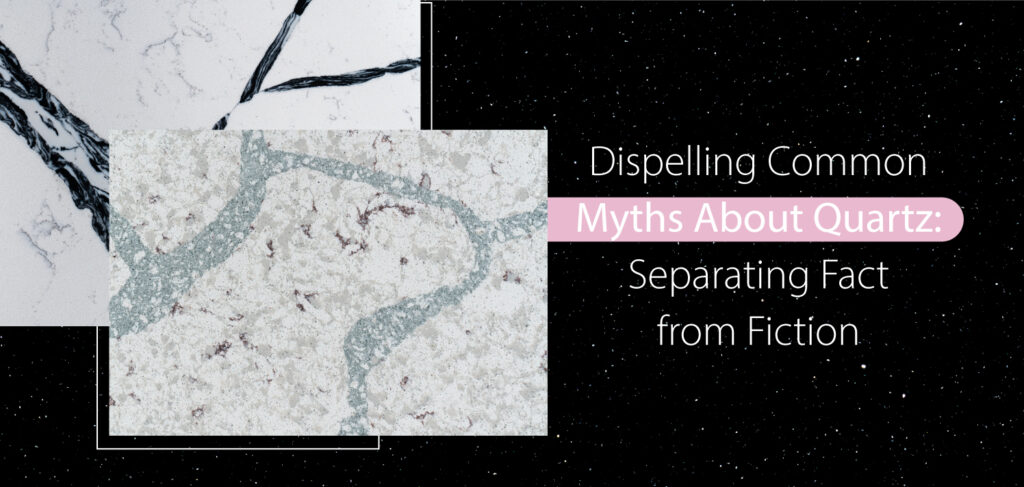Quartz has become a popular choice for countertops, flooring, and other surfaces in homes and commercial spaces due to its durability, versatility, and stunning aesthetics. However, despite its widespread use and popularity, there are still some misconceptions and myths surrounding quartz that can lead to confusion among consumers. In this blog, we’ll debunk some of the most common quartz myths and separate fact from fiction.
Myths and Facts about Quartz
Myth #1: Quartz is 100% Natural Stone:
One of the most common quartz myth is that it is a completely natural stone. While quartz is indeed made up of natural quartz crystals, it is also engineered with resins and pigments to create a durable and versatile surface material. This engineered composition gives quartz its unique properties, including resistance to stains, scratches, and heat, while maintaining the beauty and appearance of natural stone.
Fact: Quartz is an Engineered Stone:
Quartz is classified as an engineered stone, meaning it is manufactured using a combination of natural and synthetic materials. The process involves mixing natural quartz crystals with resins and pigments to create a homogenous mixture that is then cured and processed into slabs. This engineered composition allows for greater control over the color, pattern, and performance of quartz surfaces, making them highly customizable and versatile.
Myth #2: Quartz is Expensive:
Another common quartz myth is that it is prohibitively expensive compared to other countertop materials such as granite or marble. While it’s true that quartz can be more expensive than some natural stone options, its durability and low maintenance requirements make it a cost-effective choice in the long run. Additionally, the wide range of price points available in the quartz market means that there are options to suit every budget.
Fact: Quartz Offers Long-Term Value:
While the upfront cost of quartz may be higher than some other materials, its durability and low maintenance requirements make it a wise investment for homeowners and businesses alike. Unlike natural stone, quartz surfaces are non-porous and resistant to stains, scratches, and heat, reducing the need for costly repairs and replacements over time. Additionally, quartz’s longevity and timeless aesthetic appeal can add value to a property and enhance its resale value.
Myth #3: Quartz Requires Sealing:
There is a common quartz myth that countertops require regular sealing to maintain their appearance and performance. However, unlike natural stone surfaces such as granite or marble, quartz is non-porous and does not require sealing to protect against stains or moisture penetration. This is because the resins used in the manufacturing process create a protective barrier that repels liquids and prevents them from seeping into the surface.
Fact: Quartz is Low Maintenance:
One of the key benefits of quartz is its low maintenance requirements. Unlike natural stone countertops, which may need to be sealed regularly to prevent staining and etching, quartz surfaces can be easily cleaned with mild soap and water or a non-abrasive household cleaner. This makes quartz an ideal choice for busy households and commercial environments where cleanliness and hygiene are paramount.
Myth #4: Quartz is Not Environmentally Friendly:
Some people believe that quartz is not an environmentally friendly option due to its manufacturing process and use of synthetic materials. However, this is a misconception as many quartz manufacturers are committed to sustainable practices and use recycled materials in their production processes. Additionally, the longevity of quartz surfaces means that they require fewer replacements over time, reducing the overall environmental impact.
Fact: Quartz Can Be Eco-Friendly:
Many quartz manufacturers adhere to strict environmental standards and use sustainable practices to minimize their carbon footprint. This includes recycling water and waste materials, using energy-efficient production methods, and sourcing materials from responsible suppliers. Additionally, quartz’s durability and long lifespan make it a sustainable choice for consumers looking to reduce their environmental impact.
In conclusion, it’s crucial to dispel common quartz myths to make informed decisions when selecting countertop materials. Despite misconceptions, the reality is that quartz, especially brands like Jyothi, offers unparalleled durability, versatility, and aesthetic appeal. By understanding that quartz is an engineered stone, consumers can appreciate its unique properties and benefits. Jyothi’s commitment to quality and sustainability further solidifies quartz as a top choice for countertops and surfaces. With Jyothi’s quartz surfaces, homeowners and businesses can enjoy long-lasting beauty and functionality without the hassle of regular maintenance or concerns about environmental impact. By separating fact from fiction, we can truly appreciate the versatility and value that quartz, particularly Jyothi’s engineered quartz surfaces, brings to any space.


